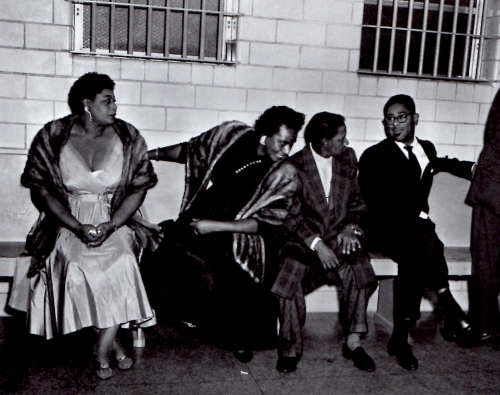
It's Time To Put Down Those Heavy Bags (Feb 2024)
My ‘marido’ came across a picture on social media this morning of one of
the 20th Century's greatest singers, Ella fitzgerald, jailed for
singing to an integrated audience; officially for gambling…
The year was 1955. Ella was black.
Many
years later, in 2018, I visited Wells' Built Museum of African American
History and Culture in Orlando Florida, somewhere Ella Fitzgerald,
among other notable stars of that era had stayed. The building was
constructed as a hotel for African Americans during segregation. Oh yes,
great artists
could sing for the white population, but actually use the same
facilities? Think again! Unfortunately scenarios such as those depicted
in the film ‘Green Book’, that came out in the same year as I visited
the museum, were all too common, which is why Victor Hugo Green, an
African American, New York City postal worker, was responsible for the
publication of the Travel Guide annually from 1936 to 1966.
Visiting
the museum was an emotional experience and I was unable to hold back
the tears as I asked the couple of ladies who were working there at that
time how they, their families, friends and the African American
population in general can move on from a shameful period of history that
is well within living memory.
They told me that “You just have
to”. And that “It's important to remember that there were many white
people, an increasing number as social awareness grew, who fought
against the racism and 'separate but equal' doctrine that existed at
that time.”
In 1967 the film ‘Guess Who's Coming to Dinner'
premiered. It starred, among others, Sidney Poitier, Spencer Tracey and
Katherine Hepburn, and the drama takes place during the course of a few
hours as two families struggle to overcome their concerns about an
interracial marriage. Surprisingly it is not only the white middle class
parents who are uncomfortable with the situation, as demonstrated by
the family's black maid who does not believe the young African American
doctor has a place amongst her white upper middle class ‘family’: “...
just exactly what are you trying to pull here [ ] just out for all you
can get. [ ] With your black power and all that other trouble making
nonsense…”
There is also the ‘baggage’ that the father of Sidney Poitier's character carries around: “Dad, [ ] I love you [ ] but you think of yourself as a coloured man. I think of myself as a man…”
My
‘marido’ and I, being gay men who grew up in the 70's, 80's, and 90's,
believe we have an idea of what that African American generation,
portrayed by the father in ‘Guess Who's Coming To Dinner’, were (are)
going through. The acceptance of same-sex relationships has changed
remarkably in the decades since homosexuality was decriminalised in
England and Wales in 1967. Those changes were happening as I grew up,
yet I confess to not feeling completely comfortable in public
physically expressing my love
for my husband, even though our relationship has been nothing but
supported by our family, friends and neighbours both in England and
since we moved to Portugal.
It was the picture of Ella
Fitzgerald's arrest which led to our discussion about ‘Guess Who's
Coming To Dinner’ and our own baggage. We realised that if we'd been
raising the generation below us, we too would have unconsciously handed
over some of our emotional and social uncertainties about our place in
society. We no doubt would have advised those younger people to be
sensitive to other feelings by not holding hands in the street or
kissing in public, advice which would have been given with the very best
of intentions, and as with the the father of Sidney Poitier's character
in the film, perhaps we each find it difficult to see ourselves only as
‘a man' …
I hope, and fully believe, that our nephews and
nieces generation are more comfortable with showing their affection in
public, and the generations below them perhaps will not even have terms
such as ‘same-sex relationships', ‘gay’ or ‘straight’, since it is my
opinion that these labels, which we often give ourselves, are divisive;
two people in love should be just that.
Definitions
of colour will doubtlessly take longer to disappear, but let's hope
that they become as inoffensive and as innocent as describing somebody
with ‘blonde hair' or ‘a beard and moustache’ …
Post Views : 384